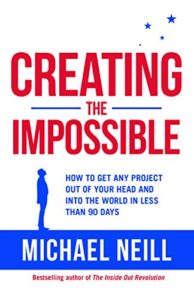Here’s my “impossible project” for Michael Neill’s Creating the Impossible 2018 program.
 In the next 90 days I will make the Three Principles the explicit foundation for coaching in the International Coach Federation (ICF) tradition. It will be obvious that this has been accomplished when the Principles are incorporated into International Coach Federation (ICF) Core Coaching Competencies and standards for accredited coach training programs.
In the next 90 days I will make the Three Principles the explicit foundation for coaching in the International Coach Federation (ICF) tradition. It will be obvious that this has been accomplished when the Principles are incorporated into International Coach Federation (ICF) Core Coaching Competencies and standards for accredited coach training programs.
Why?
The International Coach Federation (ICF) is the most widely recognized and respected global professional organization for the coaching industry. The ethics, values, and knowledge encoded in ICF policies and standards have been invaluable in my own professional development. As a trainer and mentor of coaches, I’ve seen that coaches who can demonstrate the ICF Core Coaching Competencies are more effective by far than those who cannot.
Seven years ago I encountered the teachings of Sydney Banks, now popularly known as the Three Principles. Almost immediately I saw the Principles as the “source code” for coaching. Syd shared profound realizations about the nature of human experience and the truth of our connectedness and access to wisdom and insight moment to moment. These realizations are the principles that ground the values and standards ICF has developed.
Here’s one example of the impact that understanding the Principles has on coaching. The opening paragraph of the ICF definition of coaching states:
ICF defines coaching as partnering with clients in a thought-provoking and creative process that inspires them to maximize their personal and professional potential, which is particularly important in today’s uncertain and complex environment. Coaches honor the client as the expert in his or her life and work and believe every client is creative, resourceful and whole.
According to ICF, coaches “believe every client is creative, resourceful and whole.” According to the Three Principles, this is a truth of human nature, not a belief or framework.The shift from adhering to a belief about client creativity, resourcefulness, and wholeness to seeing it as an actuality has profound implications for how coaches work.
Dr. Judith Sedgeman points eloquently to how understanding the Three Principles transforms our understanding of human potential in this post, The Infinity of Possibility. Without a 3P understanding, professional coaching remains a game played on a finite board. Coaches already understand the notion of limiting beliefs, but too often miss the fact that those beliefs are made up. What is made up does not need to be deconstructed; it can be seen through.
If you are a coach and interested in knowing more about the Three Principles, or a Three Principles practitioner interested in learning from the rich base of skills encoded in the ICF Core Coaching Competencies, let’s talk!

